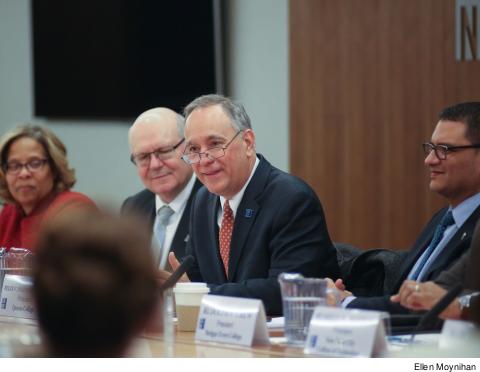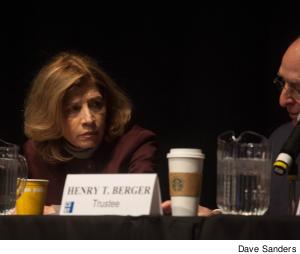First Latino CUNY chief, and a known scholar
 |
In a historic vote on February 13, the CUNY Board of Trustees designated Queens College President Félix V. Matos Rodríguez the eighth chancellor of CUNY, making him the university’s first minority chief executive.
“With sterling credentials, unparalleled depth of perception and a demonstrated commitment to CUNY,” Board Chairman William Thompson hailed Matos Rodríguez as “one of our own.”
Thompson and Trustee Kevin Kim both noted Matos Rodríguez is unique among university-system chancellors in that he has been president of both a CUNY four-year and a CUNY two-year college. The onetime Hunter College professor was president of Hostos Community College from 2009 to 2014, before heading to Queens College.
A CUNY VETERAN
The Wall Street Journal reported that under Matos Rodríguez the retention rate at Hostos Community College increased by double digits. And while he was president of QC, the Queens College Foundation doubled under his watch, and a 2016 study by the Equality of Opportunity Project (now called Opportunity Insights) ranked Queens College in the top 1 percent of all colleges in moving students from the bottom fifth to the top fifth of the country’s income distribution.
Matos Rodríguez, who earned his doctorate in history from Columbia University, is also a CUNY scholar – he has written numerous articles and books about the Puerto Rican experience in New York City. His book Women in San Juan: Puerto Rico, 1820-1868 is considered an important text that debunks the myth that Puerto Rico is a male-dominated society.
Trustee Mayra Linares-Garcia offered a word of warning before she voted to approve his appointment, saying, “I think there’s a lot of work in front of you.”
“[D]espite the advantages Matos Rodríguez brings to the position, he will not succeed unless he can solve CUNY’s immediate labor crisis,” PSC President Barbara Bowen wrote in an op-ed in the New York Daily News – the PSC has been without a contract for more than a year. “Faced with soaring enrollments since 2000 and a failure by the city and state to keep up with costs, the CUNY administration has lacked the political courage to demand the funding CUNY needs. Instead, trustees have accepted austerity budgets and the implicit premise that goes with them: that CUNY students deserve no better. The faculty and staff of CUNY repudiate that premise. Failing to challenge underfunding, CUNY has survived by increasing tuition (by 68 percent since 2008) and cutting labor costs. Both moves hurt students.”
Bowen continued, “Whether Matos Rodríguez succeeds as the next chancellor of CUNY may well depend on whether he secures the necessary public funding to settle the union contract and raise adjunct pay to a living wage.”
Indeed, President Matos Rodríguez met with Queens College adjuncts in November and listened to their testimonies about struggling to serve students on their meager pay.
“We congratulate Chancellor Matos Rodríguez and look forward to continuing to engage with him in our campaign to win a fair starting wage for CUNY adjuncts of $7K per course,” the group QC Adjuncts Unite said in a statement. “We appreciate the open-door policy he has maintained at Queens College, and we know he is well aware of our frustrations. He has heard our stories of struggling to survive on poverty wages.”
LONG SEARCH
The choice of Matos Rodríguez as chancellor comes after nearly a year of deliberation by the search committee, which consisted of trustees, faculty members and students, and was assisted by an outside consulting firm. At least one high-profile candidate, New York Public Library President Anthony Marx, pulled himself out of the running. Matos Rodríguez was reported as a finalist last summer, raising questions as to why it took another half year to settle on him in the end.
 |
Interim PSC Queens College Chapter Chair Ted Kesler is optimistic about the new chancellor given his chapter’s experience with him as the president of Queens College, where things like health and safety issues have loomed large for years.
“After spending long, late hours in labor-management meetings together, I know that Dr. Rodríguez is aware of the harm that years of fiscal austerity by the state has done to preserving Queens College and CUNY in general,” he said. “He is genuinely proud of shaping his career to serve CUNY students. He heard firsthand adjunct testimonies of their hardships, subsisting at poverty wages, in their commitment to serve CUNY students. He recognizes the shabby conditions of our Queens College facilities because we no longer have the resources to maintain and upgrade them.”
Kesler continued, “He is aware of CUNY’s trajectory to reduce full-time faculty and increase reliance on adjunct instructors as a costsaving measure. He knows that CUNY no longer pays competitive salaries to retain full-time professors. He laments state austerity measures such as the TAP Gap that costs CUNY $86 million annually and rising.” Therefore, Kesler said, the new chancellor should reject austerity and he and the board should “fight for CUNY as a social justice project.”
How much will the new chancellor fight to fund the PSC contract? It’s not clear. During an appearance on WNYC’s Brian Lehrer Show Matos Rodríguez took a call-in question from PSC First Vice President Andrea Vásquez, who cited the “scandal of underfunding the university” and asked of his plans to “settle a good contract and bring sufficient funding into CUNY.” He did not put forth a specific plan to confront the state over its underfunding of higher education, but said that the BOT and the administration would “like to do more [for adjuncts]” in terms of paying them more and said CUNY “should have more full-time faculty.” When pressed on specific plans, he reiterated, “I’m not the chancellor yet.”
GETTING EFFICIENT
In an interview with Errol Louis on NY1, the chancellor-to-be said that he would address getting more funding for CUNY. “We need to be more efficient,” he said in regard to administrative costs. He added that he hoped those savings, as well as increased revenue from more aggressive fundraising, would help put more money into student services.
Jonathan Buchsbaum, a professor of media studies at Queens College, said that while Matos Rodríguez as QC president was supportive and cooperative during labor-management meetings, union members were often frustrated with what they saw as lackluster results in terms of addressing health and safety issues and changing reclassification opportunities for HEOs.
“He meant well, but was probably restricted in what he could do, so he didn’t get a lot concretely done while he was here,” said Buchsbaum. He added that Matos Rodríguez “certainly did support diversity hiring, there was real support at Queens.”
Dean Savage, a professor of sociology and former department chair at Queens, noted that he used to send Matos Rodríguez a spreadsheet comparing the salaries of starting assistant professors at each college in a bid to raise starting salaries at Queens.
“Our starting salaries improved, not quite as much as we would have liked, but he always paid attention,” Savage told Clarion.
PSC delegates at Queens College noted that Matos Rodríguez failed to reorganize administrative departments to address workforce attrition, causing low morale. Clarion reported in 2016 that at Queens College 56 full-time faculty lines had been lost over the course of five years through attrition. The hardest hit departments were sociology, English, chemistry/biochemistry, history and philosophy.
COMMUNITY COLLEGE CONCERNS
Union officials did note the novelty of having a chancellor with experience running a CUNY two-year institution. “He is an interesting choice because he has held a range of high-level positions in CUNY, including being president of Hostos Community College,” said Lorraine Cohen, the PSC vice president for community colleges.
“The community colleges face real challenges in terms of lack of funding. There are serious physical problems and the ratio of part-time to full-time faculty is very high at the community colleges, since we teach many introductory-level courses. These part-time faculty are underpaid and undervalued. Lack of funding leads to schemes to reduce costs of remediation, diminish student choices over courses they take, larger class sizes and inadequate counseling resources,” said Cohen.
Jo-Ann Rover, an associate professor of allied health sciences at Hostos Community College and a PSC alternate delegate, called Matos Rodríguez a “sincere, considerate, extraordinary individual who I have witnessed take the time out of his daily activities to stop and acknowledge students and faculty by name.”
A CUNY ADVOCATE?
But questions remain. While he was often constrained as a campus president, will he be less so as a chancellor? Will he advocate for CUNY or will he take direction from the governor’s office, which has been hostile to public higher education? What kind of role will Thompson play? These questions loom large as the union and other advocates demand that he lead the charge in demanding more investment in CUNY from the state to fix historic underfunding of the university and address the need for across-the-board wage increases, especially lifting adjunct pay to $7,000 per course.
Matos Rodríguez will be paid an annual salary of $670,000, Thompson said, and he will also receive a $7,500 monthly housing stipend, the New York Post reported. Matos Rodríguez, who will replace Interim Chancellor Vita Rabinowitz, said that he hopes to keep “inclusion and diversity” as a center- piece of CUNY’s administration under his watch.
“I came to Hunter in 2000, driven by CUNY’s mission of access,” he said. “I remain as engaged and motivated today as I was in 2000.”

